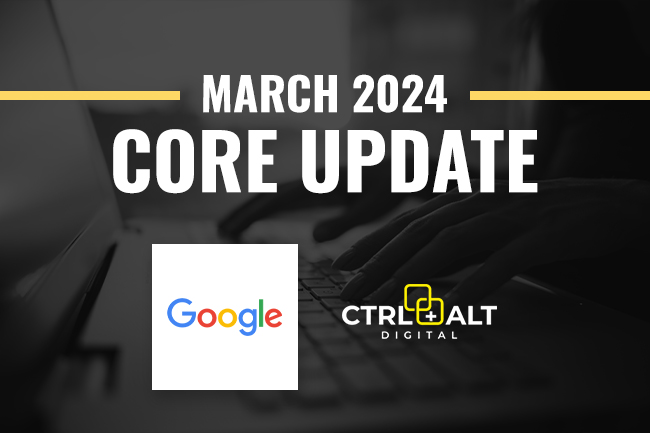
The first core update of 2024 just rolled out and many website owners are majorly impacted. Although you can never fully “future-proof” your website from the wrath of Google, there are lots of key takeaways from this core update in order to help prevent your website from being negatively impacted in the future. Let’s take a look!
Two major components make up Google’s March 2024 Core Update which means it’s really a two-in-one, complex update.
Core Ranking Algorithm Updates Including Helpful Content
At the heart of the update are significant tweaks to Google's core ranking algorithm. These changes are always shrouded in a bit of mystery as Google keeps the exact formula under wraps to maintain a fair playing field. However, Google has indicated that these adjustments aim to further refine the accuracy of search results, rewarding content that offers genuine value to the reader. With this core update, Google stated they would no longer be announcing helpful content updates since that has now been incorporated into the core update system. Google started tweaking their ranking systems in 2022 to ensure that websites with the most helpful information and original content are shown first.
New Spam Policies
March 20th concluded the rollout of the new spam policies. It took 14 days for the rollout to complete. The new harsh stance on spam is set to clean up search results. The new spam policies are cracking down on scaled content abuse (previously labeled “spammy auto- generated content”) and two new components: site reputation abuse and expired domain abuse. It’s important to understand what those mean in order to ensure your site steers clear of those practices.
Scaled Content Abuse
Previously labeled spammy auto-genered content, scaled content is a large amount of content and pages created soley for SEO purposes. Those using AI to help generate content specifically for SEO purposes, pay special attention to this update! Google has said up to 40% of low-quality websites that provide useless information coupled with a poor user experience, such as pages created solely for SEO purposes to match search terms, will be removed. Those familiar with E-A-T (Expertise, Authoritativeness and Trustworthiness) which is part of Google’s algorithm, know that this is a guideline Google uses to determine if sites are providing value to users. Sites that don’t pay attention to these guidelines will likely experience major impacts from this update. Bottom line - write for people, not search engines.
Site Reputation Abuse
Site reputation abuse occurs when a website with a high domain authority and its own valuable content hosts content from a third-party that has little or nothing to do with the content on the website/the website’s main purpose. Oftentimes, this privilege to host content on that site is sold and is solely to take advantage of the site’s reputation to boost the third party’s reputation with backlinks from a trusted (in the eyes of search engines) source and for that content to appear higher in search engine results. This can mislead and confuse users who expected to click through the search result and find different information on the landing page. This is a new addition to the spam policies and Google is giving site owners until May 5th to clean up their websites or they may be deindexed. Google says, "We’ll now consider very low-value, third-party content produced primarily for ranking purposes and without close oversight of a website owner to be spam. We're publishing this policy two months in advance of enforcement on May 5, to give site owners time to make any needed changes."
Expired Domain Abuse
Expired domain abuse, commonly referred to as “domain squatting,” is also a new addition to the spam updates. Previously, Google stated that buying expired domains will not have an advantageous impact on search results but that must not be the case if they are enacting an official policy against it. Google defines expired domain abuse as, “Where an expired domain name is purchased and repurposed primarily to manipulate search rankings by hosting content that provides little to no value to users.” Sometimes expired domains are purchased and then repurposed with the intent of capitalizing on the domain’s reputation, backlinks to it, etc. This is considered spam to Google if the intent is to boost rankings of low quality content from the new site owner.
The Impact on SEO Strategies
Considering these significant changes, here’s how websites and their SEO strategies might be impacted:
- Content Quality Over Quantity: With a spotlight on helpful content, websites must prioritize quality.
- User Experience Is Paramount: A seamless, user-friendly experience is now more crucial than ever. This is no longer just a design principle but a key ranking factor.
- The Decline of AI for SEO: Those relying heavily on AI-generated content for SEO might need to rethink their approach. The era where AI could churn out low-quality but SEO-friendly content is coming to an end.
- SEO Is About Value: Keywords and backlinks won’t count for much if the content is not valuable to the reader.
Advice for Website Owners and Content Creators
Here are quick nuggets of wisdom to ensure you’re aligned with Google's March 2024 Core Update:
- Audit Your Content: Review your website and weed out any content that may not meet the new helpfulness criteria.
- Human First: Create content with the user in mind, always.
- Monitor Performance: Keep an eye on your website’s analytics to understand how your content performs post-update.
Google's March 2024 Core Update serves as a reminder that in the world of SEO, complacency is not an option. Staying current with updates, being flexible with strategies, and maintaining a focus on creating genuinely useful content will be the keys to SEO success.
If you would like help with an effective SEO strategy, contact CTRL+ALT Digital and let us ensure your website stays ahead of the curve by adapting quickly to these changes and not clinging to outdated SEO practices!


